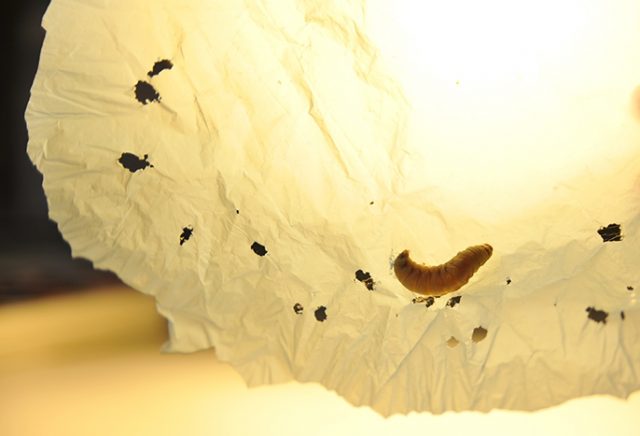
A Spanish biologist recently discovered, quite by accident, that a caterpillar that feeds on beeswax also gobbles down polyethylene, a plastic packaging material that has found its way in prodigious amounts as a pollutant in the oceans. The discovery quickly rang a bell.
Federica Bertocchini of the Spanish National Research Council (SNRC), or CSIC in Spanish, in Madrid and the University College London (UCL), who happens to be an avid amateur beekeeper, said she found that wax worms from her beehive that she had placed in plastic bags at home had quickly eaten through the polyethylene material.
Plastic bag full of holes
“In cleaning the beehives, I put the worms in a plastic bag,” she explained. “After a short while, they had escaped, and the plastic bag was full of holes.”
Beeswax is some sort of a natural plastic, she stressed, but she still has to find out if there is a specific gene in the gut or saliva of wax worms that is responsible for their ability to chomp away at plastic.
Bertocchini said in her study “Polyethylene bio-degradation by caterpillars of the wax moth Galleria mellonella” co-authored with Paolo Bombelli and Christopher J. Howe and carried in the April 27, 2017 issue of the journal Current Biology that the wax worms could provide a solution to the mounting piles of plastic trash worldwide, with more than 250 million tons of them settling in the ocean bed and other waterways.
“We started moving right away. When we saw the holes, we thought that this could actually be a real possibility,” said Bertocchini.
In no time, Bertocchini confirmed that the worms’ digestion process was breaking down the plastic, destroying polyethylene’s chemical bond and converting it to ethylene glycol, an organic compound that biodegrades in a few weeks.
Comparatively, the Spanish researcher pointed out, a polyethylene bag takes more than a century to break down, and thicker ones would require 400 years to be degraded.
Global problem
Bertocchini revealed that worldwide, about a trillion plastic bags are used annually: “Plastic is a global problem. Nowadays waste can be found everywhere, including rivers and oceans, And even remote parts of the Arctic also been invaded by plastic pollutants.”
She noted that corrosives like nitric acid or certain bacteria will take months to break down plastics.
However, 100 wax worms can biodegrade 92 milligrams (mg) in 12 hours or 184 mg in one day, while bacteria can biodegrade plastic at a rate of about 0.13mg per day.
“We do not know how wax worms developed this ability, but it might be that they evolved such a mechanism because they eat wax,” explains Bertocchini. “Wax and polyethylene have a similar chemical structure.”
However, Bertocchini is not going to propagate wax worms by the trillions to help Greenpeace rid the oceans of polyethylene and other plastic products, but she is intent on knowing the chemistry that wax worms deploy in doing the job, so that it could be replicated and possibly developed as a means to reduce plastic pollution.
She is now working with the University of Cambridge’s Department of Biochemistry to experiment with the plastic-eating caterpillars.
“There is the possibility that one molecule could do this, so the idea would be to isolate it and reproduce it at a large scale, and use this to degrade plastic waste,” said Bertocchini.
Bertocchini says this will be her focus next. “Nature is amazing,” she added. “Looking around us, we found solutions.”



